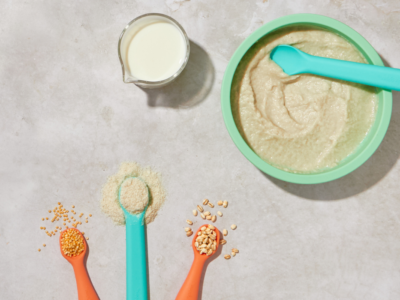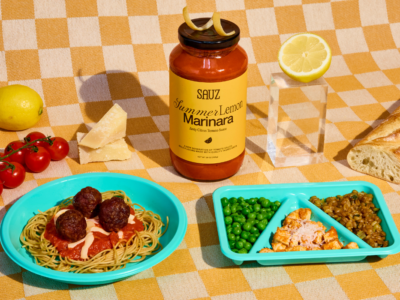Anxious at the thought of starting your baby on solids? Don’t know the right time to start this process? Welcome to the club. These are incredibly normal and valid concerns—and we’re here to help! We sat down with Dr. Cherilyn Cecchini to answer your most-asked starting solid questions.
When do I start my baby on solids?
Most families start solids between four and six months of age. It’s important that you wait until your baby is at least four months old before you begin to introduce solids. Even though you may feel that your baby is ready before this, starting solids too early is associated with increased weight gain and is not recommended. However, even as you start your mini on solids, you should continue to breastfeed or provide breastmilk or formula feedings until your baby is at least one year of age.
What about allergies?
One common worry for parents starting their little ones on solids is food allergies. I recommend introducing one new ingredient at a time every few days—this way you’ll have a better sense of what your baby is allergic to if they have a reaction. Despite the prevailing narrative, there is no evidence to suggest that waiting to introduce baby-safe, allergy-causing foods, such as eggs, dairy, peanuts, wheat, fish, or soy prevents the development of food allergies. In fact, many pediatricians would recommend against it—waiting may increase the likelihood of food allergies developing.
If certain food allergies run in the family, your babe may be considered “high-risk.” In this case, it is always best to discuss how and when to introduce these “allergic foods” with your pediatrician. If your mini reacts extremely negatively to a newly introduced food (difficulty breathing, wheezing, vomiting, or diarrhea), you must call 911.
What comes first?
Fun fact: babies are born with a general preference for fruits. So, if you’re thinking you can trick your mini’s taste buds to prefer veggies by introducing them first, you are mistaken. However, it is important to introduce a wide variety of textures and flavors to your baby during this crucial period of development as they discover and explore the sensory and nutritional properties of solid foods. Exposure to a variety of flavors, especially in the first year of life, encourages the acceptance of new foods later.
When first starting solids, single-ingredient pureed foods such as banana, apple, sweet potato, butternut squash or lentils are great options to try. Once your babe can handle these simple purees, it’s time to level up and introduce them to more complex purees like Little Spoon’s Sweet Potato Carrot or Blueberry Chickpea Spinach Pear Rosemary blends.
As they enter the world of solid food, babies can begin to explore simple, soft finger foods like peas, cooked pasta, or shredded cheese along with their purees. These are easy intro foods that you can spice up down the road with herbs, and spices.
As your babe continues their finger food journey, consider introducing superfoods around 10-12 months of age like quinoa, flaxseeds, and fish. If your babe is resistant and refuses to try these foods, don’t give up! This is totally normal—be sure to continue to reintroduce foods several times, it might take a few tries for your mini to warm up to these new textures and flavors. Re-introduction is key!
What if my baby gags?
Starting your mini on solids can be very daunting, especially with the fear that your babe may start gagging or choking on their food. That’s why it’s important to start with soft foods that are easy to chew and swallow. With that being said, babies are likely to gag as they learn to navigate solids! They may gag and even vomit, which is a natural defense against choking. This is often part of the process as they work through their journey with solids. As tempting as it can be to reach in and try to remove the food once your mini starts gagging, this may actually push the food deeper into the throat and cause it to get lodged.
Choking differs from gagging and occurs when the airway is completely blocked and your baby can no longer breathe. It may cause high pitched sounds or no sound at all and it requires immediate intervention. Call 911 immediately and begin CPR if you or another caretaker can. Your pediatrician can help connect you to your local American Red Cross office or the American Heart Association to find classes in your area.
Extra Tips And Tricks
Be sure that your baby is always sitting upright and supervised during mealtime. As cute as it is for older siblings to help feed your mini, they may not know which foods are unsafe. Don’t rush your little one when they are eating and only put a small amount of food on the tray at one time. Avoid round, firm foods and large chunks in order to help prevent choking. Avoid stringy foods or any food products that can become sticky globs. Offer only a few pieces at one time and always offer small pieces to your infant.
Introducing solids can be stressful, but your pediatrician is always there to help along the way. Exploring textures and flavors during this time of development represents an important and exciting milestone for you and your baby! Remember, everything is just a phase. So try your best to enjoy the process and know that you (and your mini) will get through this, together!
Dr. Cherilyn Cecchini is board-certified pediatrician located in New York, New York. She currently serves as a board member for the American Medical Women’s Association. She is a guest educator for Doctors in Training, contributes clinical cases for HumanDx and authors Op-Meds for Doximity. She launched her blog, www.bagofpediatricks.com, during her years as a trainee. Dr. Cecchini completed residency training in pediatrics at Children’s National Medical Center in Washington, D.C. Her research centered on end-of-life care communications and conversations between physicians, patients and caretakers. Prior to residency, Dr. Cecchini obtained her medical degree from Sidney Kimmel Medical College (formerly Jefferson Medical College) in Philadelphia, P.A. She earned her B.S. in biology from The Pennsylvania State University. You can find her on instagram here.



